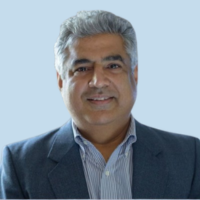Nutan Gangrade, former Managing Site Head of Quotient Sciences' Chelsea Parkway and Garnet Valley facilities, has overseen over 200 clinical manufacturing programs and the manufacture of 5 commercial products in the 17 years that he has been with the organization. In this article, we speak with him about his experience in the industry and about the capabilities offered at our Philadelphia sites.
Looking back to when you were first starting your career, was your goal to be where you are now?
After getting my graduate degree in Pharmaceutics from the University of Georgia, I started as a formulation scientist at Chase Pharmaceutical Company in Newark, NJ. At Chase, I was mainly involved in developing generic formulations. During my short tenure there, I learned about many of the manufacturing techniques and the basics of GMP. Then I moved to American Cyanamid Company where I got extensive training and learned about the whole process of drug development from discovery to launch. I had the opportunity to lead the product development group and be part of several teams including discovery chemistry/pharmacology, toxicology, IND CMC development, scale-up, and technology transfer to commercial manufacturing sites. Later I worked at Wyeth Ayerst, Dupont Merck, and Bristol Myers Squibb in the CMC product development before joining QS Pharma in 2002, which was acquired by Quotient Sciences in 2017.
You mentioned that you started your career as a formulator, how was the transition from sponsor to CDMO?
My formulator experience formed the foundation of my career. I learned a lot about the development, quality, and regulatory aspects of the industry. I decided to leave BMS and work for a start-up CDMO primarily to be able to help virtual and small companies that could not undertake development in-house. The goal was to provide the best chance of success for their molecules in clinical studies. It has been a very rewarding experience working on the CDMO side. My experience in big pharma plays a key role in my thinking when we interact with our customers. I want our team to be an extension of our customers’ team. Our teams have worked on several products, many of which are in the market now.
Before the Quotient Sciences acquisition in 2017, you were with QS Pharma for almost 12 years at the Chelsea Parkway facility. Tell us about the facility and programs that Chelsea Parkway support?
The work in our early days of existence grounded us as a reliable and flexible service provider who could develop products and meet customers’ expectations of quality and speed. Our Chelsea Parkway facility started in 2002 as a CDMO to provide early-stage development services to customers. As the pharmaceutical industry changed its focus, we had to change our growth strategy.
We decided to diversify our portfolio to include late-stage development and manufacturing. The Chelsea Parkway site became more involved in process development and larger-scale manufacture of clinical supplies. By 2008, we had leased the entire building and expanded our analytical labs, GMP area and warehouse. In 2012, we decided that we would manufacture products for the market. We expanded again and built a commercial manufacturing wing, more warehouse/dispensing areas, and a large clean equipment GMP area.
We built a team to support commercial manufacturing and in 2015, we had our first successful pre-approval inspection by the FDA. We launched our first commercial product in 2017 followed by four more. Today, we have a very strong pipeline of early-phase programs and many of these clients will stay with us through launch if their molecules are successful in clinical trials.
For all of us at Quotient, the day is always extremely busy but I look forward to coming to work every day. There are many sides of my work that are gratifying in many ways. First, we work for a noble cause: we develop and manufacture drugs that help treat serious diseases. We are helping patients by bringing the drugs to them as quickly as possible.
Second, it is absolutely the most wonderful group of people that I have ever worked with. As a team, we have achieved many successes and grown the company significantly. It is a great joy to see Quotient Sciences grow, with more colleagues joining us. We have hired and trained many colleagues who are now in leadership positions. I see myself helping to take Quotient Sciences to the next level as we undergo our next cycle of growth.
In addition to Chelsea Parkway, Quotient Sciences recently commissioned a brand-new facility just 2 miles down the road in Garnet Valley, PA. What was the need and overall goal of building this facility?
Over the past 2 years, we have more than doubled our headcount and are continuing to hire people in almost every functional area. We are looking for dynamic people who are customer and team-oriented. I am proud to say that the Quotient brand has helped the site attract high-caliber staff. Our goal is to make the company the best place to work at in our industry.
As our late-stage portfolio is growing, we needed to expand to ensure we could support our customers’ early-phase projects. Building the new Garnet Valley (GV) facility provided us with additional capacity but also enabled us to separate early-stage work from late-stage. The two require a different kind of facility and expertise. We decided to build the new facility from the ground up, which meant we were able to customize the specifications to our exact requirements.
The new facility will house all early-phase development, Phase I-II CTM, and support Translational Pharmaceutics programs in the US; where we can formulate and manufacture drug products and then integrate with clinical testing at our Miami clinical pharmacology facility. The Chelsea Parkway facility will now be dedicated to commercial manufacturing and some large-scale clinical/late-stage programs.
What do you think is one of the biggest successes at the Philadelphia locations?
The acquisition of the Philadelphia site was an extremely significant strategic step in the growth plan for Quotient as it provided the capabilities and experience to continue to work with clients beyond Phase I/II and develop or transfer client products for further scale-up. The Philadelphia facilities also provided Quotient with a footprint in the US where the highest number of pharma and biotech customers reside. Subsequently, with the Reading UK site also being added, Quotient now has a good mix of early and late development capabilities on both sides of the pond. Over the last couple of years, we have successfully used our global footprint to help customers advance their programs into later stages of development. A recent example is with the company DRGT and this is described in our case study. DRGT has worked with all six of the Quotient sites over the past few years, on a program, which started out in Phase I and is now nearing commercial launch.
Local pharmaceutical companies still represent a good portion of the clients that come through the Philadelphia facilities. How do local biotech/pharmaceutical companies benefit from the collaboration with a development and manufacturing company on their doorstep?
While the Philadelphia sites support clients from all over the world, proximity plays a significant role in our business. Many of our customers are located on the East Coast and most of the time, our customers want to be at our site to observe manufacturing or development activities or for face-to-face meetings. It is very convenient for customers close by to make a short trip to oversee their project without losing too much time from their busy schedules.
Now that Quotient Sciences has a Phase I clinic in Miami and the Philadelphia facilities can conduct Translational Pharmaceutics programs in the US, do you believe that this will change the types of programs that Philadelphia supports?
The Translational Pharmaceutics platform has been a main differentiator for our UK sites for years and our goal is to have that be the case for the US sites, as well.
We are already bringing in Translational Pharmaceutics programs into our Garnet Valley facility and continuously working with potential customers that will utilize our innovative platform. Not only does this save customers significant time and money, but our customers can also quickly transition to later-stage clinical supplies without losing time. This huge differentiator sets us apart from other small molecule CDMOs in the local area and the world.
There is no other company like ours in the world that can provide such scientifically sound, efficient, and quality drug development that saves money and time. I hope that more customers will take advantage of our expertise and services.

